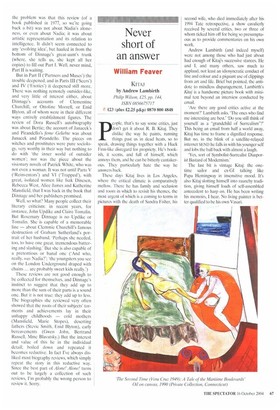Never short of an answer
William Feaver
KITAJ by Andrew Lambirth Philip Wilson, £25, pp. 144, ISBN 08566 75717 1123 (plus 12.25 p&p) 0870 800 4848 people, that's to say some critics, just don't get it about R. B. Kitaj. They dislike the way he paints, running
things past us in dead heats, so to speak, drawing things together with a Huck Finn-like disregard for propriety. He's bookish, it seems, and full of himself, which annoys them, and he can be bitterly cantakerous. They particularly hate the way he answers back.
These days Kitaj lives in Los Angeles, where the critical climate is comparatively mellow. There he has family and seclusion and room in which to revisit his themes, the most urgent of which is a coming to terms in pictures with the death of Sandra Fisher, his second wife, who died immediately after his 1994 Tate retrospective, a show cavalierly received by several critics, two or three of whom ticked him off for being so presumptuous as to provide commentaries on his own work.
Andrew Lambirth (and indeed myself) were not among those who had just about had enough of Kitaj's successive stances. He and I, and many others, saw much to applaud, not least an idiosyncratic conduct of line and colour and a piquant use of clippings from art and life. Brief but pointed, the antidote to mindless disparagement, Lambirth's Kitaj is a handsome picture book with minimal text beyond an interview conducted by email.
'Are there any good critics active at the moment?' Lambirth asks. 'The ones who find me interesting are best.' Do you still think of yourself as a "grandchild of Surrealism"?' This being an email from half a world away, Kitaj has time to frame a dignified response. But no, in the blink of a satellite-relayed internet SEND he falls in with his younger self and lobs the ball back with almost a laugh.
'Yes, sort of Symbolist-Surrealist Diasporist Bastard of Modernism.'
The last bit is vintage Kitaj: the onetime sailor and ex-GI talking like Papa Hemingway in insensitive mood. It's also Kitaj slotting himself into raunchy tradition, giving himself loads of self-assembled antecedent to harp on. He has been writing his memoirs, I hear. No living painter is better qualified to be his own Vasari.










































































































 Previous page
Previous page